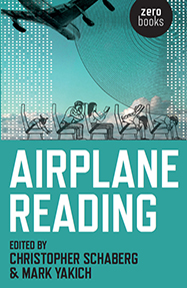It was a rainy winter night when I made my way toward the back of the Boeing 747. As the line of people before me struggled to stuff their outrageously large roller luggage bags into the overhead storage bins, I stared into the faces of the passengers who were already seated. The head of each one of them was positioned at just the right angle to be able to stare vacantly off into space without meeting the gaze of any other passengers. It was a marvel to behold, an antisocial masterpiece. Dozens of people were forced to occupy the same space for a practical reason, and like prisoners resigned to a brief period of torture, their eyes sought solace in every neutral detail of the plane’s interior. It was as if there were some brutal fact wedged between each of them, prohibiting all but the most necessary interaction. Every look had to be connected with a function, or else it was impertinent, a sign of some dire need for affection or sex. For this reason, my wandering eyes gave rise to a few counter-stares. These few passengers met my gaze but did so with a hint of animosity, as if I had violated the sanctity of some unspoken pact that bound us all to the undiluted silence of pure utilitarian functionality. None of this was out of the ordinary. Almost any store or sidewalk in America offers much the same experience.
When I finally made it to my seat, I had to squeeze awkwardly past a busty teenage girl, who did not acknowledge my presence except for an almost imperceptible look of disappointment. She suddenly found the book in her hands to be infinitely fascinating and ceased to pay attention to her surroundings. This was rather surprising to me. That a teenager should read instead of succumbing to electronic fixation was beyond remarkable. I was so impressed that I simply had to ask what she was reading. “Poetry,” she responded, and when this single utterance did not seem to be enough to satisfy me, she showed me the cover: Virgin: A Portrait of the Artist as a Young Woman. My pleasure crumbled away to nothing. Was it not enough that technology absorbed the fecundity of young minds? Was it not enough that they endlessly followed the cues of their own possessions? Could it be that all this was not complete without the defilement of literature? Was there no other way for society to finally disappear for good? How could an adolescent board a plane with such a ridiculous article in her hands, unless society did not exist and was not likely to begin existing?
As I entered into this melancholic frame of mind, my thoughts were interrupted by an abrupt beeping over the intercom. Like a god’s voice from the sky, the captain warned that we would be experiencing some turbulence. I found it strange and incredible that all of us would experience something unique together. It seemed totally implausible that there could be any rift in the perfect geometry of networks that allowed us to be perpetually separated. The brief series of minor jolts that followed merely served to confirm me in my opinion. Nothing will ever change, I thought, looking down at the girl’s book with undisguised disgust.
My contempt for the world was reaching its zenith, bubbling over and disrupting all the natural rhythms of my existence. For one brief and terrible second I believed that this was all there would ever be, just a tired exercise of people avoiding one another at all costs, a perfect algorithm for mediocre exchanges that would allow humans to hide from one another forever. It seemed like my trip to visit an ailing relative could not get much worse, but I was wrong.
In a single moment, everything changed. Gravity asserted its dominance over technology, and it was only then that I could see any humanity in my fellow passengers. We were all falling together through a space that was equally indifferent to our desires. We were losing everything in unison as we fell through the clouds. The silly girl who had once seemed so far away leaned back in her seat and clung to my armrest. “Oh shit!” I exclaimed, as one of the stewardesses dropped her tray.
When the plane finally righted itself, it became impossible not to smile, not to be social. We all laughed together. Everyone on the flight felt destined to share something with his or her neighbor, and now that it had escaped all of its normal bonds, society suddenly flourished.
Anthony DeVita lives in Indiana where he works as a GIS technician. He is also working on a collection of essays. One of his essays has been featured in Fish Food Magazine.






